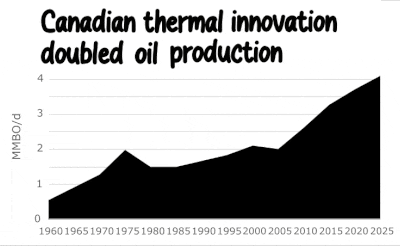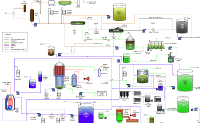Polymer - hot and salty
High temperature - high salinity
 Polymer floods can improve heavy oil recovery. But what about high temperature and high salinity conditions?
Polymer floods can improve heavy oil recovery. But what about high temperature and high salinity conditions?
Without AppIntel, you can't find out how polymer floods have faired in challenging environments. By using AppIntel, you can find all the polymer flood application documents.
One operator applied to move from fresh water to salty produced water to mix with her polymer. In her application, she discussed the affect of water temperature and salinity on her polymer flooding project. She also discussed polymer type, polymer concentration, and ultimate recovery factor.
Help yourself to the pertinent application pages through our inexpensive, self-serve application documents library.
Get details of this cool tech Subscribers get them for free?subject=Help me get up to speed on polymer flooding&body=Help me get up to speed on polymer flooding%0D%0A%0D%0AMy Name:__________ %0D%0AMy Phone Number:__________ %0D%0A%0D%0A(Or call Proven Sales at 403-803-2500.)">Contact Proven for support. We have all the details from all the installations.
Use AppIntel to find polymer flood field details
Application documents allow you to drill into all field pilot detail. You can find other's successes -- and their failures. How would you find them without AppIntel?
You can find out what happens after a flood is complete.
You can see operators that are still implementing floods even in this commodity price environment.
But what happens after a polymer flood is complete?
Check out what other operators when a polymer flood is complete. After a water flood, the operator just shuts the pool in. But after a polymer flood, a pool has a whole new life.
You can find out all about it from their AER applications.
Are polymer floods still economic at current oil prices?
Even in this commodity price environment, the AER recently approved an expansion of a successful ASP flood. All the details of the lab studies and field pilot are included in the application. They predict an additional recovery range of 10-13%.
In fact, starting a polymer flood may be one of the cheapest ways of adding reserves in this commodity price environment.
You can find out all about it from their AER application.
Check out the results
Textbooks and classes may help you understand a bit about the general principles of flooding. But if you really want to understand how floods perform in the field, you must read others' flood application documents. They report progress on floods to the regulator. Each application is ground truthed to actual UWIs. Each application is adjudicated by a picky regulator.
How would you find these applications without AppIntel?
?subject=I want a cheap and cheery one day trial of AppIntel&body=Sign me up for a one day AppIntel trial so I can check out polymer schemes. %0D%0A%0D%0AMy Name:___%0D%0AMy Phone Number:____%0D%0A%0D%0APricing: www.appintel.info/short-term-search/%0D%0A%0D%0A(Or call AppIntel Sales at 403-803-2500.)">Contact us now to try it out Search for all the polymer schemes.
Tags: Polymer, Flood
 Granger Low 11 Jul 2017
Granger Low 11 Jul 2017

Experimental Propane Solvent co-injection in thermal
Continuing Canadian thermal innovation doubled oil production

Measuring the rate of oil and gas technology growth
Energy transition inside the oil industry

The rise of water recycle
Join or perish

AppIntel AI hit alerts
Ignite your insight

Blowdown and NCG injection
SIRs often reveal more than submissions

AppIntel AI contains much more than technical papers
More current. More coverage. More detail. More trusted.

New flood to double reserves for heavy oil pool
The age of water floods is not over

Flood repatterning
Extended life support

AI makes opportunity more accessible than conferences
Which sources of technical information do you trust?




 Calgary, Alberta, Canada
Calgary, Alberta, Canada
 Share
Share